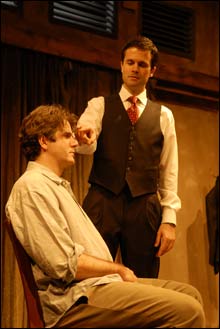Abuse and powerThe Gamm's timely and troubling Enhanced Interrogation Techniques January 30,
2007 5:43:40 PM

DISTURBING: O’Brien and Estrella in One for the Road.
|
Enhanced Interrogation Techniques, the four one-act plays at the Sandra Feinstein-Gamm Theatre (through February 25), is not for the squeamish, but not in the way you think. No physical torture takes place on stage — exquisitely painful ordeals are being inflicted on something far more vulnerable than flesh: imagination.
All of these plays are amplified by our witnessing them, of course, just as real-life torturers can rely on the faculty of imagination to do their dirty work more efficiently than hot pincers. It was humiliation, not the rack and thumbscrews, that was the instrument of choice at Abu Ghraib.
With humor and a dramatic finesse, the Gamm is skillfully segueing short works by three master playwrights — Harold Pinter, Samuel Beckett, and Peter Barnes — into an exploration of the power of persuasion when it is corrupted, when it is magnified by too much social, political or personal power.
The longest is the opening piece by Barnes, A Hand Witch of the Second Stage, directed by Peter Sampieri, who teaches directing at the Brown/Trinity Consortium. It takes place in medieval France, when Church specialists certainly knew their way around a torture chamber. Against a realistic backdrop of various instruments with sharp edges, accused witch Marie Blin (Casey Seymour Kim) stands dangling before drunken “witness” Claude (David Rabinow), who babbles forth fantasy and glossolalia about a Black Sabbath in which she rode a broom, chatted with owls, and so on. Taking testimony is Father Nerval (Jim O’Brien), and slavering in anticipation is chipper torturer Henri (Ben Johnson).
Kim is knee-slappingly funny, whipping from ridiculous to canny as Marie proves herself more clever than the diabolically misogynistic system that has inflamed her in unanticipated ways. Johnson, O’Brien, and Rabinow rise to the occasion in support, and playwright Barnes (Red Noses) provides plenty of entertaining talk that also pinpoints where each is coming from. Particular praise goes to director Sampieri for time after time finding opportunities in the text to amplify the instructive tale with insight as well as laughs. One example: after Marie accuses some bigwigs of being witches and she is asked what such powerful people would have to gain by satanic compacts, her three tormentors are simultaneously smug about the observation but then are deflated, together, when Marie responds with an undeniable: “All is not enough.”
After intermission, the two Pinter plays and the Beckett follow, all directed by Trinity Rep’s Fred Sullivan Jr. Pinter’s One for the Road is the most disturbing of the quartet, although the character who delivers most of the lines does so in a mostly light tone. Interrogator Nicholas (Tony Estrella) is nearly giddy with his power, not needing to get physical with Victor, who arrives already bruised, with his wife Gila (Karen Carpenter), who arrives raped, or with their boy Nicky (Damien Oliver Beecroft/John McGowan), whose same name as their tormentor reminds us that any mother’s son can evolve into a monster.
Pinter’s Press Conference is a brief piece that offers the bonus of a creepy plot overlap. Ramrod straight at a lectern, Sam Babbitt is a newly appointed Minister of Culture who is speaking to fawning media questioners. He recently headed the secret police, so his impatient answers have a grim and scary authority. Pinter — whose Nobel Prize acceptance remarks in 2005, heard between plays, are equally adamant — nails the circular logic of True Believers. The minister suggests that culture should be “based on respect and the rule of law,” though he and his cohorts are the ones making those laws.
The one miss of the evening for me was the closing piece by Beckett, Catastrophe. Playing it as broadly humorous instead of chillingly straight drained it of menace, as far as I could see. The characters are an imperious director (Estrella), his much abused assistant (Kim), and a wordless hunched figure (Babbitt) they are fiddling with to make look properly pathetic for an imminent theater production. Playing so ardently for laughs, the director is exaggeratedly strident as well as bullying and the assistant is telegraphing every wince.
The title refers derisively to the Theatre of Catastrophe of British playwright Howard Barker, whose favorite themes are violence and the urge for power. Catastrophe depicts how theater can manipulate pathos, so the production’s milking laughs to avoid sentimentality, rather than letting them emerge where they will, disregards the play’s fundamental humanity. A closing playlet that could rattled us awake instead leaves us merely amused.
|
 |

  

|
- Oral is the new second base, the “mostly” girls keep on kissing girls, and the Bro Job has arrived (but is still not ready for its close-up)
- The OC, when it was good
- Never mind its tough-girl alt-porn feminism: SuicideGirls has already moved on to a new generation
- Terry Murray gave away $11 million of state money. Will anyone call her on it?
- Gary Cherone’s Extreme viewpoint
-
- Terry Murray gave away $11 million of state money. Will anyone call her on it?
- 27 things that drive us crazy about the city we love
- How one woman lost her boyfriend to blood elves and orcs
- As the ProJo turns
- And rock your face off
- Amid the latest cutbacks, dejection reigns at the Globe
|
-
Viva las ropas viejas
-
2nd Story’s madcap Flea In Her Ear
-
Providence Black Rep’s Black Maria
-
Brews, ballgames, and much more
-
Trinity Rep's timeless Our Town
-
Tom Stoppard ponders this mortal coil
-
Of entertainment and evil
-
A wide range of work by Brown's faculty
-
Trinity Rep visits Our Town
|
|